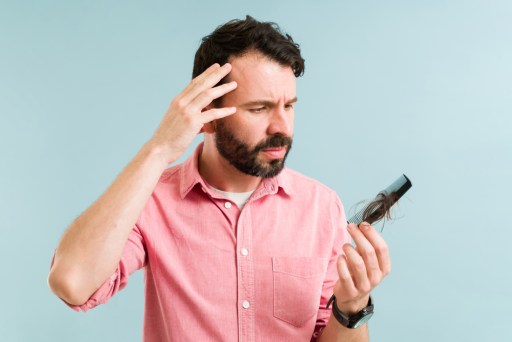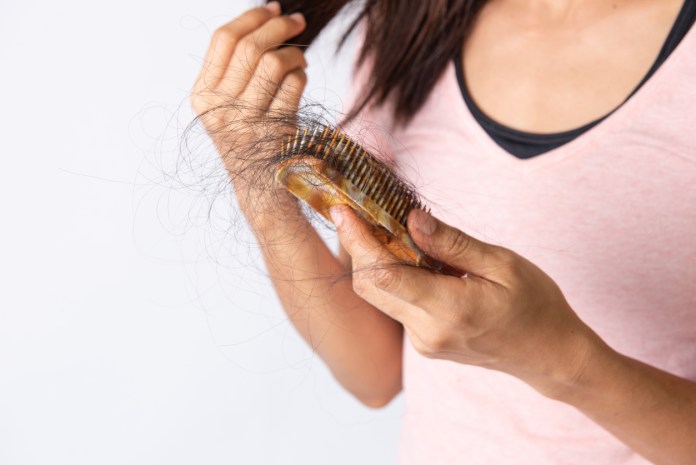COVID-19 is a virus that we don’t know much about its long-term effects. The way the virus infects people can cause lasting effects that are different for everyone such as headaches, malaise (discomfort), parosmia (loss of smell), and even hair loss. Hair loss after having been infected with COVID-19 is called ‘telogen effluvium’, and is common with an onslaught of stress. But, is the hair loss caused by stress or COVID-19 infection? While science isn’t sure yet, we do have some good news-you’re not alone and the hair loss isn’t permanent. You will have regrowth!
On the Survivor Corps Facebook group, there are dozens of posts about hair loss among people who’ve recovered from COVID-19 and still have lingering effects months later, also known as “long-haulers.” Similarly, dermatologists across the country are noting around a 25% increase in patients coming in with severe hair loss compared to before the pandemic.
Telogen effluvium is often triggered by stressful events- and more recently, a COVID-19 infection. People begin to notice the hair loss about 3 months after the stressful event (in this case, COVID-19) lasting up to 6-9 months. It was found that over 20% of patients who were hospitalized with COVID-19 experience hair loss. However, while that data alone would make it seem as if hair loss after COVID-19 was only for those who had experienced extreme symptoms, a separate study was conducted to see the relationship between COVID-19 and hair loss from September 2020 to March 2021. Measuring the experiences of 39 participants, aged from 22 to 67, all of them experienced hair loss 2-3 months after infection. A hair pull test to measure the severity of hair loss, where participants had small sections of hair (about 40 strands) from different parts of the scalp gently tugged. The results showed a mean of 35% of hair pulled from the scalp was lost. In this study, they clarify that the hair loss was not caused by any medication related to COVID-19.

Another study was conducted in New York City to view the relationship between hair loss and COVID-19 diagnosis. In this study, there were 10 participants who experienced an increase in hair loss. All being female with no prior experience of hair loss with a median age of 55, 6 of the participants had mild symptoms of COVID-19 and the remaining 4 had to be hospitalized. This further reinforces the idea of the previous study that hair loss from COVID-19 is not exclusive to those who suffered from extreme symptoms. A pull test was done with positive results (hair became detached from the scalp).
So, how do you know if you are dealing with telogen effluvium after a COVID-19 diagnosis? If you notice you’re losing hair, do not begin to panic. Hair growth occurs in cycles: anagen, catagen, and telogen. In the anagen phase, your hair is beginning to grow. The catagen phase is when your hair stops growing. Lastly, in the telogen phase, your hair is “resting” for about 2-3 months until it falls out, starting the cycle of growth again. In the telogen phase, you can experience 100-150 hairs being shed a day- a normal occurrence. Therefore, when you are experiencing telogen effluvium, your hairs begin the telogen phase earlier than they should, causing more hair loss than usual.

If you are dealing with telogen effluvium after COVID-19, there is no need to worry about whether or not your hair will go back to normal. Hair grows back once it is in the anagen phase, and there are ways you can keep your hair strong and healthy (which we’ve written about here including nail health too!). Make sure you focus on a healthy lifestyle with adequate exercise and that you’re consuming the right vitamins, minerals, and nutrients for hair health such as iron, vitamin C, zinc, vitamin B12, proteins, and folic acid.
If you are looking for ways to promote hair growth, here are 5 tips to try out:
Scalp massage


Since the main culprit of telogen effluvium is stress, a scalp massage can help you feel calm, relaxed, and relieve you of any stress. Moreover, a study was done in 2016 that found that scalp massages can help boost your hair health. For just 4 minutes a day daily, you can find yourself with thicker and stronger hair. Another study done in 2019 found that the massage increased blood flow to the scalp, leading to hair growth.
Aloe vera

Aloe vera has been used for thousands of years to treat a myriad of ailments. One of them bebing hair loss. By applying aloe vera gel to the scalp, not only can you promote hair growth, but also treat dandruff and get rid of gunk under clogged follicles.
Rice water rinse

Dating back to the Chinese village of Huangluo, using rice water rinses on the hair is a common practice there to promote hair growth and keep it strong with a study done in 2017 that found promising results. To get the rice water, rinse the uncooked rice thoroughly and then let the rice soak in a bowl of water for about 30 minutes. Strain the rice and then your rice water is ready for use!
Biotin

Biotin is a great supplement to help with not only hair growth, but also nail growth! As a vitamin B, this supplement can help hair grow faster, but it will not affect the thickness of the hair. A study done in 2017 found hair and nail growth in those who suffered from brittle nails and hair after taking biotin supplements.
Coconut oil

Coconut oil has tons of healing properties, such as fatty acids that can get into the hair shaft to prevent hair loss. Simply by massaging the coconut oil into your scalp, you can increase blood flow to the scalp to promote hair growth and also nourish the hair you already have to prevent damage.

















